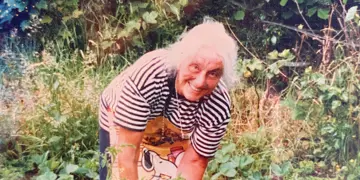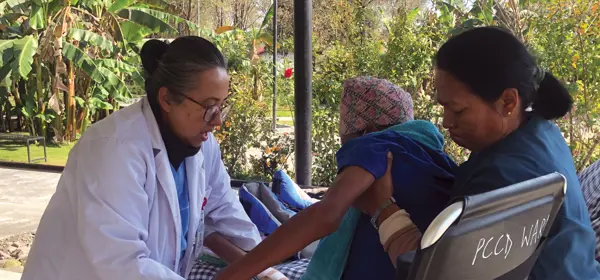A hard road: a doctor's struggle
A hard road: a doctor's struggle
A refugee Jewish doctor who escaped Nazi Germany to flourish in a working-class northern town is celebrated in a new book
It is difficult to envisage a harder route into the profession than the journey taken by Elena Zadik, the subject of memoir-cum-biography Elena: A Hand Made Life.
Born in Kharkiv, Ukraine, in 1919 she was a refugee twice as a child – the second time when moving to England in 1936. She left her parents who were forced to remain in Nazi Germany to pay off family debts to fulfil her dream of training to become a doctor. The odds were firmly stacked against her as she arrived in a freezing and far-from-welcoming London. As the book puts it: ‘Who would want a female doctor? Without a British education? Or a proper address?’
This was just one of many hurdles and crises the indomitable and bloody-minded Dr Zadik took on during an ‘ordinary extraordinary life’, which is presented in words, pictures and mixed media by her granddaughter Miriam Gold, an artist and teacher from London. Ms Gold’s book is already garnering rave reviews, with The Guardian describing it as having ‘unfathomable power and richness’.
The book begins towards the end of Dr Zadik’s 40-year career doing her afternoon rounds as a single-handed GP in the former mill town of Leigh, Lancashire, driving (badly – she proudly boasted to her granddaughter of never having had any driving lessons) her red, second-hand Mini with her granddaughter on the back seat. It vividly captures a time when GPs were close and lifelong companions with their patients. As Ms Gold puts it: ‘My GP, through no fault of her own, I don’t know her, she is a voice on the other end of the phone … whereas Granny couldn’t get round a shopping trip without five people stopping her.’
Personal trauma
She was a local celebrity in Leigh. ‘She looked a bit different and sounded a bit different. Leigh was a very cotton-and-coal town. And here was this Russian Jewish woman,’ says Ms Gold. And to prove the point, Ms Gold has been contacted by families of ex-patients since the book was published in August.
One son and grandson recounted the care Dr Zadik offered to two generations of his family as well as an instance where she lobbied the council to provide proper housing for his mother. ‘She was a legend, a much-loved and respected pillar of the community,’ he told Ms Gold.
The book is also the story of Dr Zadik’s husband Frank (born Franz) – a German Jew and fellow refugee whom she met at medical school in Sheffield. The book describes the two as sharing ‘a language for things that were unspeakable’ given their personal backgrounds and romance blossomed while they regularly hiked in the Peak District. Frank went on to a distinguished career himself as an orthopaedic surgeon – he had a procedure for ingrowing toenails named after him called the Zadik procedure.
Who would want a female doctor? Without a British education?
Dr Zadik
The couple endured unimaginable personal trauma early in their relationship – Frank was dubbed by British authorities an ‘enemy alien’ and sent to an internment camp in Canada for a year in 1940.
Bereft of Frank, Dr Zadik had also lost touch with her parents during the war before discovering their fate – sent to their deaths in Auschwitz from Vichy France – years later via her cousin who travelled to England to tell Dr Zadik the dreadful news in person.
And professionally Dr Zadik was battling – working in the pre-NHS system with many poor and destitute patients not being able to afford her treatment, her husband then working abroad as a doctor in the army and all this while becoming a mother
There was no maternity leave, no family to offer support. ‘She was lonely, depressed and overwhelmed,’ Ms Gold writes and the language for much else of what she endured – ‘the glass ceiling, institutional sexism and systemic racism’ – had not been invented yet.
‘Beacon of hope’
It is no surprise the advent of the NHS in 1948 came as a particular beacon of hope for Dr Zadik – it was ‘the best day of her life’, Ms Gold writes. Her euphoria at that moment even trumped the births of her four children as the health service was ‘a joy for everyone’.
Dr Zadik retained this love until her death in 2006, having retired at 70. But just as during her working life she remained a ball of activity and energy even after hanging up her stethoscope – using her hands to knit, work with ceramics to churn out brown pots and take and develop her own photos.
She couldn’t get round a shopping trip without five people stopping her
Ms Gold
What would she make of the NHS as it is now and the struggles in general practice in particular? ‘It would upset her greatly to see the low morale,’ Ms Gold says. ‘She would hate to see how care is compromised by targets and workloads.’
Ms Gold also wonders how her grandmother’s no-nonsense approach with patients would have been received today. ‘Actually, probably really well I imagine as she was refreshingly blunt. She called a spade a bloody shovel as they say in Leigh ...’
The author can be found on Instagram at @miriamgold
(Picture credit: Miriam Gold)



